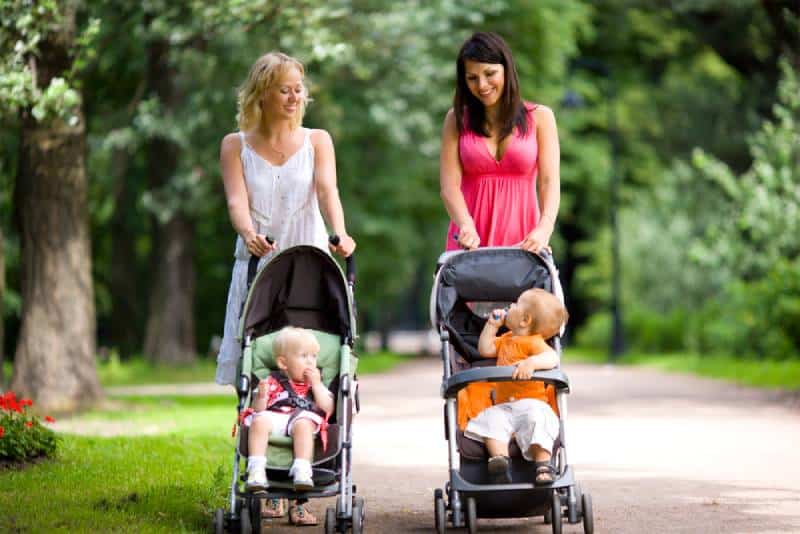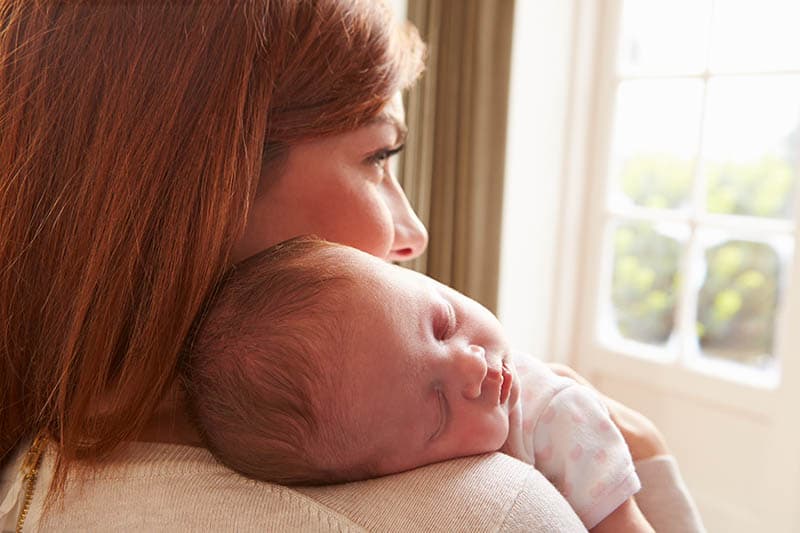Does breastfeeding make you tired? Or is it just your regular, run-of-the-mill postpartum fatigue?
Due to hormones, it’s entirely possible that breastfeeding can make you tired, although the Herculean task of caring for a new baby can send your energy levels into a downward spiral all on its own.
The hormones in question are oxytocin and prolactin, which are responsible for your letdown reflex and production of milk. These hormones also help you feel relaxed and calm while nursing your little one, which can contribute to drowsiness.
What’s more, oxytocin is known as the hormone of love and strengthens the strong emotional bond you share with your child.
So, when you sit down to feed your baby and are enveloped in such a relaxing and beautiful sensation, it’s natural that your body wants to shut down and get some sleep.
But since falling asleep with your baby at your breast carries significant risks, it should be avoided.
To fight postpartum sleepiness, you can try any of the 10 tips below to save your energy. Trust me, it’s more important than you think – extreme fatigue might even lead to postpartum depression.
Throughout this journey, remember that sleep deprivation of this caliber is only temporary. At some point in the future, you will get a full night’s sleep, I promise!
Does Breastfeeding Make You Tired?

Caring for a new baby will put even the most energetic of mamas into a tired state. Night feedings, diaper changes, and adjusting to the change in your routine can all cause your energy levels to dip. But breastfeeding mothers can find it even more difficult to feel well-rested during the day.
So, why does breastfeeding make you tired? There are several reasons.
Of course, if you’re exclusively breastfeeding and not pumping or supplementing with baby formula, you are the only source of nutrition for your little one, making it necessary for you to get up and breastfeed whenever your baby is hungry – even multiple times in the middle of the night.
But there is another reason breastfeeding moms feel more tired than usual – and it’s hidden in the hormones released during nursing: oxytocin and prolactin.
Oxytocin plays an important role in the release of breast milk (or letdown) and it also helps your uterus recover after the intense experience that is pregnancy and childbirth. But it’s also important on an emotional level, too, and it’s no surprise that it’s frequently called the “love hormone.”
When you’re nursing your baby, this hormone helps the two of you bond and fosters an intense feeling of love in new mothers. But as this hormone lowers your stress levels and makes you feel more relaxed, it can cause sleepiness.
The hormone prolactin, on the other hand, is used by the body to make breast milk and maintain your milk supply. And it also aids in relaxation and helps you feel calm, which contributes to drowsiness, too, especially when combined with postpartum fatigue.
So, yes – the answer to does breastfeeding make you tired? is a resounding yes.
However, it would be unfair to blame your sleep deprivation solely on breastfeeding. Remember that your body is still recovering from childbirth and adjusting to your new reality, and tiredness is a natural consequence thereof.
Apart from hormones, fatigue may be also caused by a breast infection such as mastitis. Other symptoms of mastitis include fever and painful breastfeeding. If you suspect you might have an infection, talk to your doctor or an international board-certified lactation consultant (IBCLC).
10 Tips To Keep Your Energy Levels Up While Breastfeeding
For a new mom, avoiding severe exhaustion is not just important for her ability to take care of her baby, but it plays a key role in good mental health, too. Here are some ways you can boost your energy (or at the very least, avoid feeling like a walking zombie) while nursing your baby.
1. Be active

Although light exercise sounds counterintuitive when it feels like you’re fighting sleep every minute of the day, being active can actually re-energize you, in addition to improving your overall mood.
Your ability to do some light exercise depends on how your birth went and whether or not you had a C-section, but even if you aren’t up for an actual workout, just going for a walk with your baby in tow can do wonders for how rested you feel.
When you’re spending all your time indoors, it’s normal to start feeling lethargic, even for someone who doesn’t have a newborn. So, you can imagine the effect that constantly being at home could have on you!
If it’s possible, incorporate a light yoga practice into your day. Nothing too rigorous, of course, but some stretching and deep breathing can be the power boost you need.
2. Be selective about visits

Family members and friends can’t wait to meet the baby after her arrival, and it’s not unusual to see moms asking for advice on how to politely say no to guests they’ll need to entertain. (Friends and family who offer to help, however, should be excluded from this group.)
Unfortunately, not everyone realizes that what new parents need is time and help. However, you shouldn’t feel like you’re supposed to entertain anyone but your child at this point, and don’t be afraid to let people know that now is not a good time to visit.
If you decide to have guests over, make it clear that they should come over at a specific time that works for you.
But what should I do if they get upset? Don’t worry about it! Right now, your baby is your priority. Everything and everyone else can wait.
3. Nap whenever possible

If you have more than one child at home, sleeping when the baby sleeps is more challenging. However, if this your first baby, you should take advantage of sneaking in naptime whenever possible. Don’t stay up too late, either.
Keep your little one in a baby bassinet close to your bed so you spend as little energy as possible getting up in the middle of the night for feedings.
When you’re in the middle of the storm that is life with a new baby, try to remember that sooner or later, your little one will start sleeping more. In the meantime, try to prioritize your sleep over other household chores.
4. Be comfortable when breastfeeding

There are different breastfeeding positions you can try to find out which one is most comfortable for you. For nursing mothers who are struggling with a lack of sleep, I recommend nursing while lying down in bed in the laid-back position.
This way, you allow your body to rest and relax while your baby gets the nourishment she needs. What’s more, nursing while lying down is a great position during postpartum recovery, especially if you had perineal tearing during birth or a C-section.
This position also allows your baby to unlatch easily if your milk is flowing quickly.
But even if you aren’t dealing with any severe postpartum pain or overly fast milk flow, nursing while lying down saves you from spending a lot of energy.
Just make sure you don’t fall asleep, as this could be dangerous for the baby, and if you feel yourself drifting away, try to keep yourself awake by playing a game on your phone, for example.
5. Stay hydrated

One of the direct causes for fatigue is poor hydration, as losing fluid in your body reduces the amount of oxygen that reaches your muscles. That’s why you should drink enough water every day, without substituting it with juice or other soft drinks.
If you’re a big coffee drinker, remember that caffeine lowers your hydration by increasing the production of urine, so you should up your water intake to make up for the fluid loss.
6. Continue taking your prenatal vitamins

While you were pregnant, you were probably taking some brand of prenatal vitamins to make sure your baby could develop healthily. However, you don’t need to stop taking them after giving birth. In fact, many doctors recommend taking them for as long as you are nursing your baby.
They can especially help if you have iron-deficiency anemia, which is quite common in women who are pregnant or have recently given birth due to heavy loss of blood.
Unfortunately, many women fail to recognize the symptoms of anemia because they are quite common and include fatigue, feeling weak and dizzy, headaches, and having cold feet and hands.
Since many different brands offer prenatal vitamins, make sure that the one you choose contains vitamin D and calcium, in addition to iron. These nutrients are not just important for the baby’s development in utero, but also for early growth and the prevention of rickets.
These supplements can also balance out the deficiencies in your own body, especially if you haven’t been able to eat well with all the challenges of caring for a newborn.
7. Stay on top of your nutrition

Although vitamin supplements such as Emergen-C during breastfeeding are great, they can’t substitute a healthy postpartum diet. And with a new baby at home, it’s not surprising for parents to order take-out more frequently than usual because they simply don’t have time to cook. Still, for the sake of your health, you should try to eat as healthy as possible.
While you’re nursing, you’re going to need to consume more calories than before you were pregnant. The Centers for Disease Control and Prevention (CDC) recommend eating 2,300 to 2,500 kilocalories per day, but this is just a general guideline for women who are nursing.
Your age and how active you are, for example, will also play a role in how many extra calories you need to eat per day.
Your diet will need to include plenty of protein, calcium, and whole grains, alongside vegetables and fruit. If you are concerned with losing weight, take it one step at a time and avoid low-calorie diets that cause quick weight loss. Not only are they bad for your health but they can contribute to fatigue.
Sweets will give you a quick energy boost, but once you crash, you’ll realize it wasn’t worth it. Instead, eat snacks that are high in protein.
To keep tiredness at bay throughout the day, it’s best to eat smaller, more frequent meals rather than 3 big meals. Plus, you’re less likely to experience the drowsiness that follows a big lunch.
RELATED: Does Breastfeeding Make You Hungry? All Questions Answered
8. When possible, take the easy road

Thanks to the internet, there are many things you can do from your couch. Why would you go grocery shopping if there is a delivery service that will bring the groceries to your doorstep? Such services will save you precious time and energy, which you can use to prepare a meal or relax and watch an episode of your favorite show.
Don’t be afraid to reach out to your friends and family and ask if they could come over and lend you a hand with some chores or preparing food. Even if they don’t have kids of their own, few people wouldn’t be able to empathize with your situation.
9. Check in with your friends

You might not feel comfortable leaving your baby at home with someone else just yet, and that’s normal – your baby needs you, and you want to be there for her, especially in the first few weeks of her life.
The problem lies, however, in feelings of isolation and loneliness. And spending an hour or two catching up with your friends over a cuppa might be just what you need to feel re-energized and ready to tackle anything motherhood throws at you.
Another way to have some fun is to go and get your hair done – a shorter haircut is a great way to offset postpartum hair loss – maybe you can even get some shut-eye while the stylist is washing your hair. A mani and pedi will also help you unwind and practice some self-care.
Don’t let mommy guilt trick you into thinking you’re a bad mom for wanting some alone time – you need it to be the best mom you can be.
10. Avoid alcohol

The American Academy of Pediatrics (AAP) recommends avoiding drinking altogether while you’re breastfeeding, not only because it can get into your breast milk but also because it can change the way it tastes, and your baby might not want to drink it.
What’s more, the common tip to pump and dump your milk to get rid of any alcohol present doesn’t work – you need to wait at least 2 hours after having a drink before feeding your baby.
It can also cause a sudden drop in milk supply, and as milk production can be a big issue for many new moms, you might not want to eat or drink anything that could decrease it.
Alcohol will make you drowsy, too, in addition to disturbing your sleep, so it’s best to hold off on having an evening glass of vino for as long as possible.
Consequences Of Postpartum Fatigue

Does breastfeeding make you tired? It’s certainly a contributing factor to your drowsiness. But whether as a result of breastfeeding or the overall stress of caring for a baby, feeling constant fatigue can have severe consequences if left unaddressed.
Extreme fatigue can leave a mother unable to properly respond to the baby’s needs and may even contribute to the development of postpartum depression (PPD). In fact, a 2006 study showed that women who were feeling fatigued 2 weeks postpartum were more likely to experience symptoms of PPD at 4 weeks postpartum.
PPD should not be confused with the baby blues, a period of emotional turmoil that commonly appears a few days after labor and lasts up to 2 weeks postpartum. Although the two share some symptoms, women with PPD may also experience feeling hopeless and worthless, have suicidal thoughts, or thoughts of harming their child.
As such, PPD is extremely serious and needs to be treated right away. You can have PPD even if you didn’t experience it with previous children.
Final Thoughts
So, does breastfeeding make you tired? It certainly has the power to do so. When your body releases the hormones oxytocin and prolactin, you feel relaxed and calm, and the only thing that matters is the feeling of your baby in your arms. Coupled with general postpartum sleepiness, it’s easy to feel drowsy while you’re nursing.
In addition, exclusive breastfeeding means that you’ll be getting up many times in the middle of the night as there is no one else that can nurse your baby for you – unless you decide to incorporate bottle feedings, of course. Such an irregular sleep schedule is bound to throw you off your balance.
In the first months of your baby’s life, tiredness and a bit of baby blues are normal and expected. However, if fatigue makes it difficult for you to go about your everyday tasks or you feel yourself slipping into postpartum depression, reach out to a professional who can help you.
Remember that the most important thing you can do for yourself right now is to treat your mind and body right. This means good food, plenty of rest, and accepting that sometimes it does take a village to raise a child. Good luck, mama!
References:
Centers for Disease Control and Prevention. 2020, October 8. Maternal Diet. Centers for Disease Control and Prevention.
American Academy of Pediatrics. 2020, July 17. Alcohol & Breast Milk. Healthy Children.
Corwin, E. J., Brownstead, J., Barton, N., Heckard, S., & Morin, K. (2005). The impact of fatigue on the development of postpartum depression. Journal of obstetric, gynecologic, and neonatal nursing : JOGNN, 34(5), 577–586.
Like this post? Please share or pin it for later. You can also stay in the loop and follow us on Facebook, Instagram or Pinterest.

This post contains affiliate links. Please see our full disclosure for more info.

